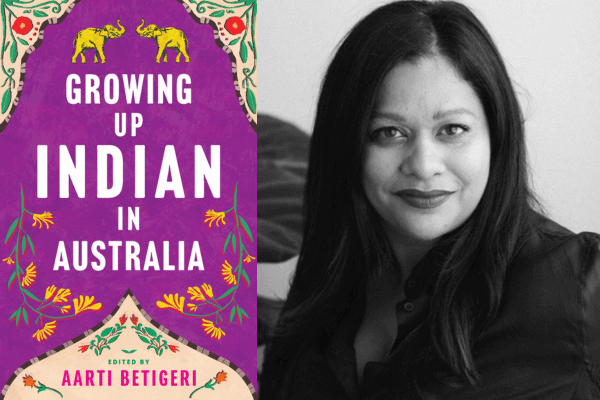The wonderful thing about anthologies is the sheer variety on offer; there’s something for everyone, an assortment of voices all pointing in their own way towards a common direction.
Edited by journalist, writer, broadcaster and former foreign correspondent Aarti Betigeri, Growing Up Indian In Australia is an assemblage of stories from Indian Australians across all walks of life, aiming to showcase the richness of experiences and identities within the diaspora.
The book comes at a time where, as Betigeri puts it in her introduction, the Indian global community is ‘starting to see itself represented in popular culture as it actually is’. Growing Up Indian In Australia is a welcome entry to this discourse, offering an intriguing exploration of both the commonalities and differences constituting the Indian Australian experience.
As Betigeri notes in her introduction, Indian Australian is ‘not a one-size-fits-all descriptor’ and overall, Growing Up Indian In Australia does a great job of not reducing or defining this term and embracing the plurality of regions, religions and languages it contains. The book casts a delightfully wide net in its selection of stories, from established contributors to new voices, from Anglo-Indian to Baghdadi Jewish.
Though wide-ranging in contributors, Growing Up Indian In Australia wants for diversity in form and style; the original Growing Up Asian in Australia (2008) featured poems, pictures, even a comic. Such experimentation with form is missed amongst the consecutive first-person essays, needed to place in relief the ideas of family, language, culture and place explored within each story and offer a chance to come up for air.
Equally, diaspora readers hoping for new conclusions will find many of the deep truths it seeks to reveal are ones already intensely familiar to them. Memories of being the ‘dark’ or ‘hairy’ kid with the ‘weird smelly food’ in primary school are revisited again and again in successive first-person accounts; though this becomes slightly repetitive to read, it demonstrates how unfortunately ubiquitous this early experience of othering is.
But Growing Up Indian In Australia is at its strongest when it goes beyond literal reflections on adolescence; when its writers dare to break the mould and interpret ‘growing up’ in a slightly more abstract sense.
Sharon Verghis’ ‘A Tale of Three Beaches’ situates its exploration within the beloved Aussie institution over multiple points in time, simultaneously capturing her own evolution and that of the country’s cultural zeitgeist.
Tejas Bhat describes drifting away from religion whilst in university after a childhood ardently following Sathya Sai Baba in ‘A Brahmin’s Crossroads’, the Upanayana ceremony only one of many rites of passage in his piece.
And in ‘My Name is Not’, Sneha Lees writes lucidly and with candour about reconciling childhood trauma and her relationship with her parents, cleverly underpinned by subheadings charting her prismatic, fluctuating relationship with her name.
Equally potent are the pieces that understand ‘growing up’ is perpetual and incomplete, seeking to instead weave a tapestry of how the threads of the past constantly emerge in the present; Preeti Maharaj’s ‘A Tangle of Tenses’ beautifully puts words to the Anne Lamott saying that we ‘contain all of the ages we have ever been’, and Shreya Tekumalla’s ‘Painted’ literally manifests the idea of conversing with your childhood self.
An anthology is not just about the individual brush strokes constituting it, but the larger picture it paints. Zooming out, Growing Up Indian In Australia is an affirming display of the literary talent we have within the diaspora, effectively capturing that tension of existing in-between which we’ve all come to know. Diaspora readers certainly leave feeling like they’ve ‘seen themselves, but in a hall of mirrors’; sometimes this is a fleeting glance, and sometimes an insightful gaze.
Either way, the sum of Growing Up Indian In Australia‘s parts makes a thought-provoking whole that’s ultimately nebulous, like identity itself. It doesn’t try to, nor can it, offer any simple answers as to what ‘growing up Indian Australian’ truly is, but instead some sketches and provocations as to what this elusive experience might be.
I remember distinctly the quiet comfort the original Growing Up Asian In Australia gave me as I studied it in high school. It’s heartening to imagine this latest entry to Black Inc’s ‘Growing Up’ anthology series stimulating other fellow ‘cultural chasm’ traversers, a welcome foothold in a rocky journey.
Growing Up Indian In Australia is available online and at independent bookstores from July 2 2024.
READ ALSO: Mum and daughter caring for nature, one book at a time





